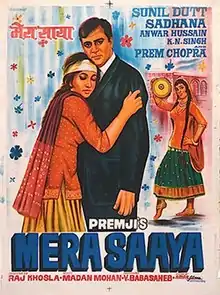Mera Saaya
Mera Saaya (transl. My Shadow) is a 1966 Indian Hindi-language thriller film directed by Raj Khosla. The music is by Madan Mohan and lyrics by Raja Mehdi Ali Khan. The film stars Sunil Dutt and Sadhana. This is director Raj Khosla's third film with Sadhana after Ek Musafir Ek Hasina (1962) and Woh Kaun Thi? (1964).[2] The film became a box office success.[3] It is a remake of the Marathi film Pathlaag (The Chase).[4]
| Mera Saaya | |
|---|---|
 Poster | |
| Directed by | Raj Khosla |
| Screenplay by | G.R. Kamath |
| Based on | Pathlaag by Raja Paranjape |
| Produced by | Premji |
| Starring | Sadhana Sunil Dutt K.N. Singh Prem Chopra |
| Cinematography | V. Babasaheb |
| Edited by | Das Dhaimad |
| Music by | Madan Mohan Raja Mehdi Ali Khan (lyrics) |
Release date |
|
Running time | 140 minutes |
| Country | India |
| Language | Hindi |
| Box office | ₹ 3,50,00,000[1] |
Manohar Amberkar won the Filmfare Best Sound Award.
Plot
Thakur Rakesh Singh, an affluent descendant of the royalty, is a lawyer and happily married to Geeta for three years. He goes to London for higher studies and after one year receives the news of his wife's illness. He immediately comes back only to witness his wife's death in his hands. He builds a small memorial in her memory in his mansion. He deeply mourns her by always sitting at that memorial and listening to recorded songs sung by Geeta.
While things are like this, one day a police inspector Daljit comes to meet him. He explains to him about the bandit they caught on the other day, Raina who claims to be the wife of Rakesh. Rakesh meets her and gets shocked as she looks exactly like Geeta. But he rejects that she was his wife as he saw his wife dying and cremated her with his own hands. But that woman claims that she was indeed Geeta and tells him about intimate moments they shared. Rakesh gets surprised but suspects some mischief.
The case proceeds in the court and Rakesh starts to cross-examine that woman. She answers every question correctly and claims that she was kidnapped by someone two to three days before her arrest. When Rakesh asks why she has no mangala sutra on her, which was a compulsory ornament for married Hindu women, she tells him that she removed it before going out on that day. He wouldn't believe that, as Geeta would consider mangala sutra very sacred and wouldn't have removed it.
After some drama, he asks her about her diary, which Geeta always keeps near to her and she fails to answer. He decides that she was just an impostor and asks the court to convict her. She becomes emotionally unstable after all this drama and ends up in a mental institute. One night, she escapes from there and comes to Rakesh's house. There, she explains to Rakesh all that has happened.
Geeta had a twin sister named Nisha, who was a bandit just like their mother. Geeta hides the fact about her criminal family and marries Rakesh. But one day her sister comes to her in a pitiable condition and asks her to give her shelter for one night. Geeta, seeing her sick get out of her house to buy medicine. But she doesn't want other family members to know about Nisha and makes Nisha dress like her and even gives her own mangalsutra to Nisha. But when she comes out, Ranjit singh, Nisha's husband mistakes her for Nisha and takes her away without giving her a chance to talk. When Ranjit Singh discovers that she wasn't Nisha, he wants to take her back, but police arrest them on their way back. While she was explaining all this to Rakesh, Ranjit Singh comes there and confirms her story. Police shoot him and he dies at Nisha's memorial. Rakesh and Geeta reconcile and start their regular life.
Cast
- Sunil Dutt as Thakur Rakesh Singh
- Sadhana Shivdasani as Geeta / Raina (aka Nisha)
- Shivraj as Family Doctor
- K.N. Singh as Prosecuting Lawyer
- Anwar Hussain as Inspector Daljit
- Prem Chopra as Daku Suryavar Singh / Ranjit Singh
- Manmohan as Doctor (in mental hospital)
- Dhumal as Bankeji
- Mukri as Munshiji
- Jagdish Sethi as Judge
Music
The music for the film is composed by Madan Mohan. All lyrics were written by Raja Mehdi Ali Khan.
| # | Title | Singer(s) | Duration |
|---|---|---|---|
| 1 | "Jhumka Gira Re" | Asha Bhosle | 03:29 |
| 2 | "Aap Ke Pahloo Mein" | Mohammed Rafi | 03:32 |
| 3 | "Mera Saaya Saath" | Lata Mangeshkar | 06:02 |
| 4 | "Nainon Mein Badra" | Lata Mangeshkar | 03:34 |
| 5 | "Nainon Wali Ne" | Lata Mangeshkar | 02:56 |
| 6 | "Mera Saaya Saath – 2" | Lata Mangeshkar | 04:21 |
References
- "Box Office 1966". Box Office India. Archived from the original on 22 September 2012. Retrieved 2 February 2012.
- "rediff.com, Movies: Classics Revisited: Mera Saaya". Rediff.com.
- "Worth Their Weight in Gold!". boxofficeindia.co.in. Archived from the original on 15 September 2017. Retrieved 17 November 2015.
- Rajadhyaksha, Ashish; Willemen, Paul (1998) [1994]. Encyclopaedia of Indian Cinema. British Film Institute and Oxford University Press. pp. 381–382. ISBN 0-19-563579-5.
External links
- Mera Saaya at IMDb